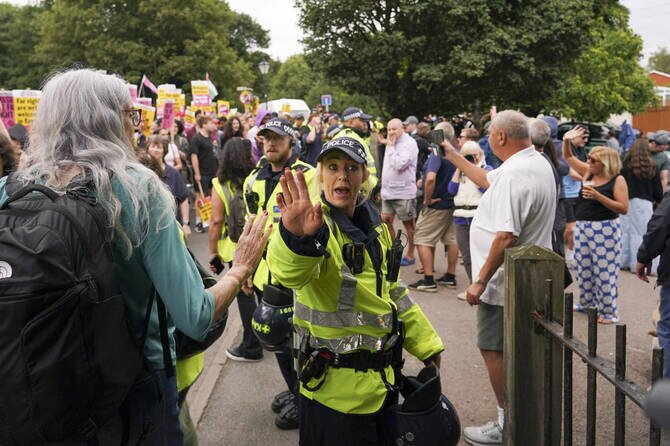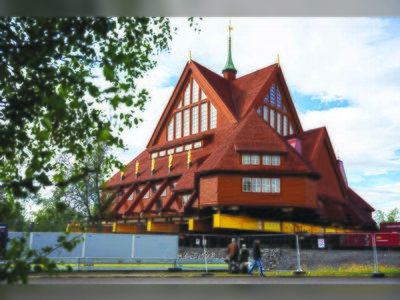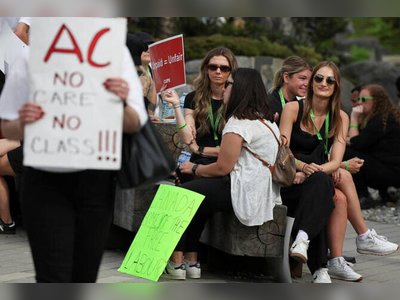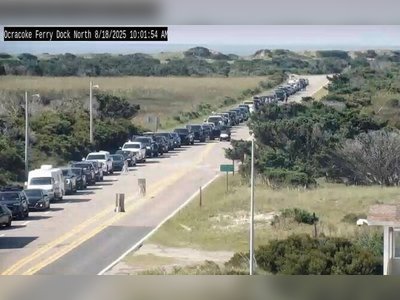
UK Judge Blocks Asylum Seekers from Being Housed at Protest-Hit Hotel
A UK judge approves a local authority's request for a temporary injunction to prevent asylum seekers from being housed at the Bell Hotel in Epping, raising questions about the government's ability to provide accommodation for refugees and migrants.
A UK judge has blocked asylum seekers from being housed at a hotel in a town that has witnessed violent protests.
The high court judge approved a request by the local authority in Epping, located northeast of London, for a temporary injunction to stop migrants from being accommodated at the Bell Hotel.
This ruling comes after the interior ministry was unsuccessful in attempting to dismiss the case.
It highlights concerns regarding the government's ability to provide accommodation for asylum seekers and refugees.
The situation also puts Labour Prime Minister Keir Starmer under pressure from the hard-right Reform UK party, which has been critical of his inability to stop irregular migrants from crossing the Channel to England on small boats.
Protests erupted in Epping in July following an incident where an asylum seeker was charged with sexually assaulting a 14-year-old girl, though he denies the allegations.
Since then, numerous protests and counter-protests have taken place outside the Bell Hotel, with further anti-immigration demonstrations spreading to London and other parts of England.
The council argued that housing migrants at the Bell Hotel posed a 'clear risk of further escalating community tensions' and sought an injunction requiring the hotel's owners, Somani Hotels Limited, to remove asylum seekers from the property within 14 days.
Judge Stephen Eyre granted the interim order but gave the owners until September 12th to cease housing the migrants.
The Home Office lawyers argued that granting the request would 'substantially impact' their ability to provide accommodation for asylum seekers across the UK.
Police have reported at least six protests in Epping since July 17, with some demonstrations involving attacks on officers and vehicles.
Several men appeared in court on Monday charged with violent disorder related to these protests.
Starmer has pledged to reduce the number of migrants and asylum seekers in Britain, as well as limit legal migration, in an effort to counter pressure from the far-right Reform party led by Brexit leader Nigel Farage, which is gaining popularity in polls.
Over 50,000 individuals have made the perilous crossing from northern France in rudimentary vessels since Starmer took office last July.
Labour has committed to ending the use of hotels for asylum seekers before the next election, expected in 2029, aiming to save billions of pounds.
The high court judge approved a request by the local authority in Epping, located northeast of London, for a temporary injunction to stop migrants from being accommodated at the Bell Hotel.
This ruling comes after the interior ministry was unsuccessful in attempting to dismiss the case.
It highlights concerns regarding the government's ability to provide accommodation for asylum seekers and refugees.
The situation also puts Labour Prime Minister Keir Starmer under pressure from the hard-right Reform UK party, which has been critical of his inability to stop irregular migrants from crossing the Channel to England on small boats.
Protests erupted in Epping in July following an incident where an asylum seeker was charged with sexually assaulting a 14-year-old girl, though he denies the allegations.
Since then, numerous protests and counter-protests have taken place outside the Bell Hotel, with further anti-immigration demonstrations spreading to London and other parts of England.
The council argued that housing migrants at the Bell Hotel posed a 'clear risk of further escalating community tensions' and sought an injunction requiring the hotel's owners, Somani Hotels Limited, to remove asylum seekers from the property within 14 days.
Judge Stephen Eyre granted the interim order but gave the owners until September 12th to cease housing the migrants.
The Home Office lawyers argued that granting the request would 'substantially impact' their ability to provide accommodation for asylum seekers across the UK.
Police have reported at least six protests in Epping since July 17, with some demonstrations involving attacks on officers and vehicles.
Several men appeared in court on Monday charged with violent disorder related to these protests.
Starmer has pledged to reduce the number of migrants and asylum seekers in Britain, as well as limit legal migration, in an effort to counter pressure from the far-right Reform party led by Brexit leader Nigel Farage, which is gaining popularity in polls.
Over 50,000 individuals have made the perilous crossing from northern France in rudimentary vessels since Starmer took office last July.
Labour has committed to ending the use of hotels for asylum seekers before the next election, expected in 2029, aiming to save billions of pounds.










